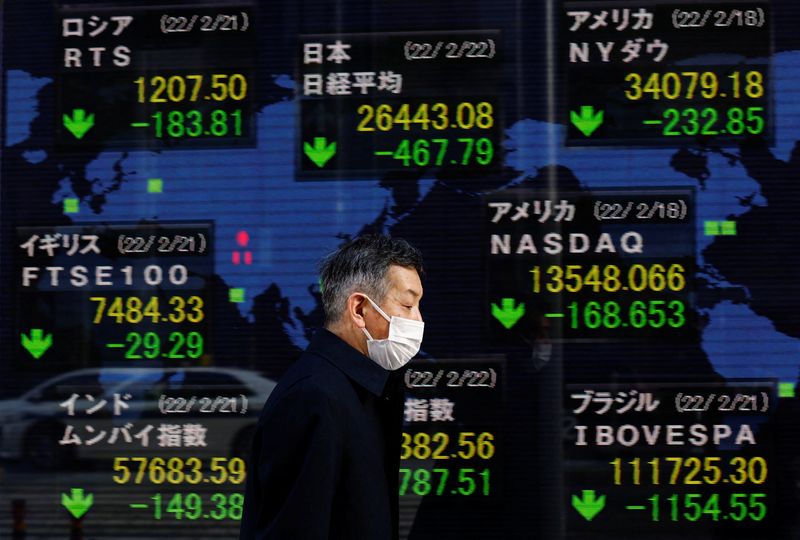 © Reuters. FILE PHOTO: A man wearing a protective mask, amid the coronavirus disease (COVID-19) outbreak, walks past an electronic board displaying Japan's Nikkei index and various countries' stock market index prices outside a brokerage in Tokyo, Japan, February 22
2/2
© Reuters. FILE PHOTO: A man wearing a protective mask, amid the coronavirus disease (COVID-19) outbreak, walks past an electronic board displaying Japan's Nikkei index and various countries' stock market index prices outside a brokerage in Tokyo, Japan, February 22
2/2
By Sinéad Carew
NEW YORK (Reuters) -Investors rediscovered much of their appetite for riskier bets by Thursday afternoon with the MSCI global index finishing well above its session low and the U.S. dollar paring gains while oil futures pulled back from multi-year records after Russia's invasion of Ukraine and responses from other countries.
After falling sharply earlier in the day, U.S. Treasury yields pared most of their declines and Russia's rouble recouped much of its losses against the dollar while safe-haven gold was in the red after earlier rising as much as 3.5%.
While the S&P had steadily regained lost ground after hitting its session low around the open, a noticeable improvement in risk appetite followed U.S. President Joe Biden's unveiling of new sanctions against Russia. He said the United States is working with oil producers to secure global energy supplies.
While Biden insisted that U.S. forces will not fight in Ukraine he said additional forces would be authorized to go to Germany. Sanctions cited involved Russian banks and technology imports but did not involve oil and gas or the SWIFT international banking system.
Investors, who are most concerned about inflation in areas such as energy, were relieved by what the sanctions did not include, according to Jack Janasiewicz is portfolio manager at Natixis Investment Managers Solutions.
"Historically speaking whenever you get military incursions, the blueprint has been to sell in the run up to the incursion and once tanks start rolling in across borders, you're supposed to buy it," said Janasiewicz.
He noted that investors were buying assets such as technology stocks, which had been selling off ahead of the invasion.
"You're selling your winners to buy the losers right now. That's the rotation we're seeing," he said.
MSCI's gauge of stocks across the globe closed down 0.46% after earlier falling more than 3% to touch its lowest level since March 2021.
The Dow Jones Industrial Average closed up 92.07 points, or 0.28%, at 33,223.83 while the S&P 500 gained 63.2 points, or 1.50%, to 4,288.7 and the Nasdaq Composite added 436.10 points, or 3.34%, to close at 13,473.59.
U.S. crude settled up 0.77% at $92.81 per barrel, but well below its session high of $100.54 and Brent settled up 2.3% at $99.08 compared with its session high of $105.79.
The dollar index was up 0.91%, with the euro down 1.01% at $1.1195. Earlier the greenback had risen to a two-year high and as much as 1.62% against a basket of major currencies. (FRX)
The Russian rouble RUB= weakened 4.51% versus the greenback to 84.96 per dollar after softening to a record low of 89.986 per dollar.
Benchmark 10-year notes last rose 4/32 in price to yield 1.9651%, from 1.977% late on Wednesday. The 30-year bond last fell 5/32 in price to yield 2.2818%, from 2.275%. The 2-year note last rose 2/32 in price to yield 1.5697%, from 1.6%.
Spot gold was last down 0.3% at $1,902.86 an ounce after earlier rising as high as $1,973.96.

